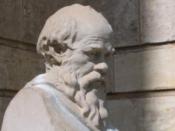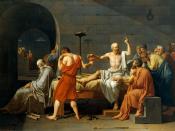Adam Martin Page � PAGE �2� � DATE \@ "M/d/yyyy" �11/12/2008�
The Trial of Socrates
And What It Exposed About the Athenian Ideal
According to the Oxford English Dictionary, an ideal is "a standard of perfection, beauty or excellence and as an ultimate object or aim of endeavour." The Athenian Ideal therefore, was to have the type of society that the Athenians thought to be perfect. This meant freedom of speech, a democracy and freedom of thought, to allow the sciences to develop. The trial of Socrates exposed the limits of this ideal in three ways. Firstly, it undermined their ideal of freedom of speech, accusing him of using evil words to corrupt the youth of Athens. Secondly, the ideal of innocent until proven guilty was completely disregarded, as Socrates trial turned into a he-said/she-said type of argument with very little proof on either side. Thirdly, it showed the hypocrisy of the ideal since Athenians thought that to uphold the ideal, they had to break from it and make an exception.
First, a brief historical context. From 490-480 BCE�,�, Athens had two wars with the Persians, both of which resulted in Athenian victories, leaving the Persians very bitter. Ten years later, in 4691, Socrates was born. In another ten years, Pericles, the most powerful Athenian leader ever, took control of and led Athens into its golden age, which lasted until the Peloponnesian War of 4311, which pitted the Spartans and the Persians against the Athenians and their Delian league. A plague hit Athens in 4301, and Pericles was kicked out, only to be reinstated one year later, right before dieing of the plague. The war then wound down and was about to end with the tentative signing of a 50 year peace treaty in 4211 between Sparta and Athens. However, in 4201, Alcibiades, a former student of Socrates, who Socrates saved in 4321, at the battle of Potidaea, became the lead General. In 4161, Alcibiades captured Melos, and brutally killed the men and enslaved the women and children, even though they had surrendered. Socrates remained silent, which led some to accuse him of having double standards. In 4151, Alcibiades led an expedition into Sicily, but was recalled to face the charge of defacing a statue of Hermes. He fled to Sparta, where he helped the Spartans overthrow Athens' democracy and replaced it with the dictatorship of the four-hundred1. In 4041, Athens fell to the Spartans, who placed the thirty tyrants in control, the leader of which was Critias, another one of Socrates' former students. The democracy was restored one year later, likely saving Socrates' life, since he had disobeyed a direct order from the 30 to capture Leon of Salamis.� Another attempt to overthrow the democracy toke place in 4011, and it again featured Socrates' former pupils. This attempt is defeated and in 3991, Socrates was tried and convicted of 'corrupting the youth' and 'not believing in the state religion'.
Freedom of speech. Athens was one of, if not the, very first civilizations in which this was one of the main tenants of its laws�. However, Athenians would put aside these laws whenever they saw a threat to their dominant place in the Greek world. In Socrates' case, it was simply because they needed someone to blame for their pathetic loss to Sparta in the Peloponnesian War, and as Alcibiades and Critias were not on hand, they decided on Socrates. He was chosen because the three sets of traitors were all lead by people who had listened to him exercise his right to free speech. Thus, the Athenian people decided that to uphold their ideal, they had to make an exception, like the Americans did in Vietnam, or like any other civilization has done at some point in their history.
Innocent until proven guilty. This was another part of the Athenian ideal that was again tossed aside to protect the ideal from a perceived threat. During the trial, no evidence was brought forward that Socrates had intentionally or even unintentionally corrupted the youth or that he did not believe in the state religion.� In fact, the only statements that did not pertain to Socrates' character went towards the talk of the Oracle at Delphi and how Apollo's priestess had given him the divine inspiration to do what he did.�
Hypocritical ideal. As stated before, an ideal is something that is perfect. For Athenians to uphold their ideal, they broke from it. This is one of the moral questions that have been a matter of debate since the beginning of mankind. Even Socrates himself did not answer this question adequately, though he did give us an interesting definition of what a just man is, which is at odds with the Athenian ideal.� However, the general consensus is that to break an ideal to uphold it defeats the purpose of having the ideal. Since the Athenians felt the need to break from their ideal to uphold it, it exposes one of two things. Either, it exposed the limits of the ideal, such that it could not survive since you would need to break from it to quash every threat, or it should the limit in that no practitioner of the ideal could uphold it without feeling the need to break from it. Either way, the trial of Socrates exposed a serious flaw in the ideal.
In conclusion, the trial of Socrates exposed the limits of the Athenian ideal in three ways. First, the trial relied on breaking from the ideal of freedom of speech to find a guilty verdict. Second, the guilty verdict was found without any proof, breaking from another part of the ideal. And thirdly, and perhaps most importantly, the trial exposed the impracticality of the ideal in that it could not be practiced without needing to break from it.
� "Socrates Chronology." UMKC School of Law. http://www.law.umkc.edu/faculty/projects/ftrials/socrates/socrateschrono.html (accessed November 6, 2008).
� Hooker, Richard. "Ancient Greece: The Persian Wars." Washington State University - Pullman, Washington. http://www.wsu.edu/~dee/GREECE/PERSIAN.HTM (accessed November 7, 2008).
� Hooker, Richard. "Ancient Greece: The Pelopponesian War." Washington State University - Pullman, Washington. http://www.wsu.edu/~dee/GREECE/PELOWARS.HTM (accessed November 7, 2008).
� Timeline: a history of free speech." The Guardian.com - The Observer. 5 Feb. 2006. 6 Nov. 2008 <http://www.guardian.co.uk/media/2006/feb/05/religion.news>.
� "Apology of Socrates (by Plato)." UMKC School of Law. http://www.law.umkc.edu/faculty/projects/ftrials/socrates/xenophonapology.html (accessed November 8, 2008).
� Plato, and Benjamin Jowett. "The Internet Classics Archive | Apology by Plato." The Internet Classics Archive: 441 searchable works of classical literature. http://classics.mit.edu/Plato/apology.html (accessed November 8, 2008).
� Plato, translated by G.M.A. Grube. Plato's Republic. Indianapolis: Hckett Publishing Company, 1974.





